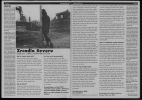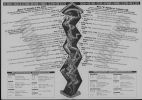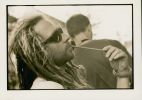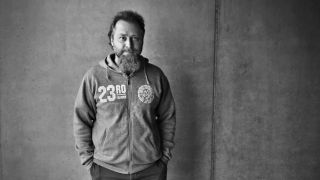My relationship to the independent and alternative art scene developed during the 1980s in the underground music and art environment. I got involved mainly as an independent journalist, focusing on punk, alternative and industrial subcultures and was working as a foreign correspondent for several magazines abroad (Maximum Rock and Roll, and others).
Since the 1990s my main goal has been to work as a producer for Czech alternative music and theater groups to bring them to Europe and also to invite foreign bands and performance and modern dance ensembles and artists to the Czech and Slovak Republics. I managed to organize international tours for a wide range of artists on a global scale. My experience and my connections brought me to open the Social-Cultural Center in Prague 6, Dejvice. It had the same name as my agency and record music label: Black Hand. This Social-Cultural Center started to operate in Prague in 1991 and lasted until 1997. We managed to establish there the autonomous space for young artists and activists from different fields, such as environmental and animal rights, human rights and feminism, and the promotion of alternative lifestyles and fostering community development.
In 2001, I opened a similar project in Broumov, where I became a driving force of the alternative art space Centrum Broumov. This project operated between 2001 and 2003. One of our projects was a four-month international festival of art “Broumov Cultural Summer”. This continued for several years on a smaller scale even after Centrum Broumov was closed.
My experience with the independent art scene covers nearly 40 years.. I think that the 1990's were the most fruitful and most vital period, in terms of independent culture in the Czech Republic and even throughout Europe and the USA. At the time, we could get funding for art and culture from different institutions and sponsors, public funding for alternative venues and autonomous youth spaces. It started to decline after the establishment of the “Schengen agreement” of the European Council in 1985 and since the founding of the European Union in 1993. In the following years, the squat movement and club scene were systematically erased. A parallel influence occurred with the boom of the emerging electronic media such as the Internet and social media and the impulse of youth to invest in their own creativity or their interests in unique subcultures. When I recognized this lack of curiosity for alternatives, I decided to cancel all activities opened a small publishing house and in Broumov for books focusing on local history and local culture.
The independent art scene, as well as the environmentally, human rights or animal protection oriented movementsI was involved in attracted many young people. This was not only because of this philosophy and the values, but also because of the way it was achieved: through a D.I.Y.approach, cooperation, solidarity, and operating on an international or global scale. All of these were interconnected and many of those involved in the alternative music scene did automatically share values of the environmental movement and human rights. The development of similar communities and movements triggered a necessity for open access spaces; new clubs, theaters, contemporary art and autonomous centers, galleries, squats, site-specific projects and festivals were booming during those years. This had, of course, a stronger tradition in the West, and was something relatively new in the Czech Republic. After years living under oppression, or in the underground, this became a challenge for me, and for many of my friends and allies. Especially during the early 1990s, an entire new network of different spaces, agencies, art producers agencies was blooming. I thought that our dreams were becoming reality because in almost every small town there was some new place devoted to independent art, in every larger city there were much more, covering a variety of focuses and people of different backgrounds. The touring of bands and performance companies was feasible and frequent and the general public was grateful for almost everything new and unusual. As a result of our recently gained freedom and self-determination we got the feeling that we were part of a permanent network of a vibrant and vivid cultural scene.
Unfortunately, this feeling of “temporary paradise” did not last for long. Already during the mid 1990s and especially at the end of the ´90s, things started to change dramatically for the worse. The driving force was usually the interests of developers, property owners, speculators and even the government, represented by both local and state governmental politicians. They managed to eliminate and neglect many autonomous cultural spaces and alternative communities. Autonomous movements turned out to be too weak and not prepared to resist the power of the authority and within a few years practically faded out. Many actors in the alternative scene found their new jobs in conventional cultural establishments, or decided to leave culture forever.
I know that since that time various initiatives striving for improvement of places of independent culture on the local and governmental scale emerged. Nevertheless, I still believe that the current situation is getting worse every year. Only very few old alternative spaces remain: Prague Roxy or Meet Factory are the relics of the “old times”. But their dramaturgy and their way of operation changed and their status of independence is questionable: there are different factors, such as the legislation of non-profit activities, general approach towards culture and towards communal cultural projects especially. Artists who are not integrated into the mainstream, not being employed by official cultural agencies or show business, hardly survive and have little chance to exhibit their works. Outside of larger cities, such as Prague, Brno, Ostrava or Pilsen the situation is even worse. Such sad conditions drive young artists to leave and local art scenes in smaller towns or villages are practically non-existent.
As a former citizen of Prague and a villager in the Broumov area in North-East Bohemia for the last nearly 25 years, I think I am able to compare and feel the difference: Broumov artistic activities are almost 100% imported, and zero initiative comes from the local scene. These are very rare and not occurring on a regular basis, rather they are sometimes initiated by individual activists, thanks to their personal engagement. Usually such activists burn out and leave without somebody carrying on with or somehow building upon their activities. As a result, small towns and remote regions today suffer from a lack of culture. This situation has a very negative impact at the social and political level.
Petr Bergman,
Prague, November 2023
English proofreading by Sarah Brock








